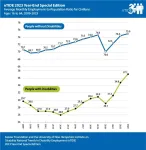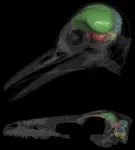(Press-News.org) A study study published today reports that BIPOC individuals who were infected with COVID-19 experienced greater negative aftereffects in health and work loss than did similarly infected white participants.
Despite similar symptom prevalence, Hispanic participants compared to non-Hispanic participants and BIPOC participants compared to white participants had more negative impacts following a COVID-19 infection in terms of health status, activity level and missed work, the authors wrote.
The findings appeared in the journal Frontiers in Public Health. The authors investigated the longer-term impacts of acute COVID-19 infection across ethnic and racial groups. They longitudinally followed 2,402 U.S. individuals first infected between 2020 and 2022.
“We want to understand what is driving these differences, with the goal of advancing health equity after infection,” said lead author Dr. Kelli O’Laughlin, associate professor of emergency medicine and of global health at the University of Washington School of Medicine.
The authors surmised that some of these negative outcomes among BIPOC participants — when compared with those of non-Hispanic and white participants — may be associated with socioeconomic disparities.
“We found that several minority populations reported worse overall health, lower activity levels or more missed work months after infection. While we don’t know what caused these different impacts, we know that these populations can have a harder time accessing health care, which may complicate their recovery,” added Kari Stephens, a professor of family medicine and of biomedical informatics and medical education at the University of Washington School of Medicine.
“Certain demographic groups might be overrepresented in front-line work industries, where they had no option to work from home to reduce their risk of infection,” O’Laughlin said.
Other differences across population groups might stem from the lack of health insurance, mistrust of the medical establishment, cultural or institutional racism, medical deserts, or the lack of safe parks or green spaces where study participants live, she said.
Study participants were asked to record their symptoms from a list of 22, including loss of taste, shortness of breath and sore throat. While the investigators found few symptomatic differences across the groups at three- and six-months after infection, there were significant health effects and work loss among BIPOC populations.
Among the findings:
Hispanic participants were about twice as likely as non-Hispanic counterparts to self-report fair or poor health and much lower activity levels at three months. These differences, however, were no longer present at six months.
Compared with white participants, those who identified as “other/multiple race” were nearly twice as likely to report fair or poor health and describe that they were somewhat or much less active at three months. These differences persisted at 6 months. The “other/multiple race” group included individuals identifying as American Indian or Alaska Native, Native Hawaiian or Pacific Islander or selecting two or more races.
Compared with white participants, Asian participants’ chances of reporting fair/poor health was similar at three months, but Asian participants were more likely to report fair/poor health at six months.
Reports of more than five missed workdays was similar across all race groups at three months; at six months, however, reports of missed work were much higher among Black participants (by almost three times) and other/multiple race participants (by more than two times).
The researchers described these differences in the context of accounting for other demographic factors that affect populations, such as social determinants of health, substance use, preexisting health conditions and COVID-19 vaccination status.
“We found a difference in health status by ethnicity and race after acute SARS-CoV-2 infection,” said O’Laughlin.
She and other UW Medicine researchers have been studying the health consequences of COVID-19 under the Innovative Support for Patients with SARS-CoV-2 Infections, or INSPIRE, a multisite group funded by the Centers for Disease Control and Prevention.
O’Laughlin said she hopes the findings will inform effective and equitable health interventions for underserved populations who are still managing the aftereffects of COVID-19 infections.
INSPIRE is a federally funded collaboration of eight major academic medical centers, including UW Medicine, seeking to better understand the long-term effects of COVID-19. The participants self-reported their symptoms in a standardized questionnaire. The INSPIRE group has been studying COVID-19 since the first documented U.S. case was found just outside the Seattle area in January 2020. This is the seventh study released by the group.
This work was supported by the Centers for Disease Control and Prevention, National Center for Immunization and Respiratory Diseases (75D30120C08008).
END
BIPOC individuals bear greater post-COVID burdens
In a study, Black and multiracial participants reported more days of lost work and health aftereffects when compared with white participants.
2024-01-31
ELSE PRESS RELEASES FROM THIS DATE:
Anchoring single Co sites on bipyridine-based CTF for photocatalytic oxygen evolution
2024-01-31
Photocatalytic water splitting using semiconductors is regarded as a promising technique for producing hydrogen fuel from solar energy. The oxygen evolution half reaction has proven to be the bottleneck for photocatalytic overall water splitting owing to the high energy barrier and the sluggish kinetics. It is a big challenge to develop efficient photocatalysts for the advancement of water oxidation.
Similar to graphene carbon nitride, π-stacked covalent triazine frameworks (CTFs) have gained much attention in photocatalytic water splitting in recent years. The fully conjugated structure with the regular channels in the crystalline network will provide defined pathways for ...
AI-powered app can detect poison ivy
2024-01-31
Poison ivy ranks among the most medically problematic plants. Up to 50 million people worldwide suffer annually from rashes caused by contact with the plant, a climbing, woody vine native to the United States, Canada, Mexico, Bermuda, the Western Bahamas and several areas in Asia.
It’s found on farms, in woods, landscapes, fields, hiking trails and other open spaces. So, if you go to those places, you’re susceptible to irritation caused by poison ivy, which can lead to reactions that require medical attention. Worse, most people don’t know ...
Up to three daily servings of kimchi may lower men’s obesity risk
2024-01-31
Eating up to three daily servings of the Korean classic, kimchi, may lower men’s overall risk of obesity, while radish kimchi is linked to a lower prevalence of midriff bulge in both sexes, finds research published in the open access journal BMJ Open.
Kimchi is made by salting and fermenting vegetables with various flavourings and seasonings, such as onion, garlic, and fish sauce.
Cabbage and radish are usually the main vegetables used in kimchi, which contains few calories and is rich in dietary fibre, microbiome enhancing lactic acid bacteria, vitamins, and polyphenols.
Previously published experimental studies ...
Increase in annual cardiorespiratory fitness by 3%+ linked to 35% lower prostate cancer risk
2024-01-31
An increase in annual cardiorespiratory fitness by 3% or more is linked to a 35% lower risk of developing, although not dying from, prostate cancer, suggests research published online in the British Journal of Sports Medicine.
The findings prompt the researchers to conclude that men should be encouraged to improve their level of fitness to help lower their chances of getting the disease.
There are relatively few known risk factors for prostate cancer, note the researchers. And while there’s good evidence for the beneficial effects of physical activity on ...
High quality diet in early life may curb subsequent inflammatory bowel disease risk
2024-01-31
A high quality diet at the age of 1 may curb the subsequent risk of inflammatory bowel disease, suggests a large long term study, published online in the journal Gut.
Plenty of fish and vegetables and minimal consumption of sugar-sweetened drinks at this age may be key to protection, the findings indicate.
A linked editorial suggests that it may now be time for doctors to recommend a ‘preventive’ diet for infants, given the mounting evidence indicative of biological plausibility.
Cases of inflammatory bowel disease (IBD), which includes Crohn’s disease and ulcerative colitis, are increasing globally. Although there is no obvious ...
Next government should declare a national health and care emergency
2024-01-31
The government in post after the election should declare a national health and care emergency, calling on all parts of society to help improve health, care, and wellbeing, say experts in the first report of The BMJ Commission on the Future of the NHS.
The new government should, in effect, relaunch the NHS with a renewed long term vision and plan, they argue.
"The NHS has never seemed so embattled—and its core principle of ‘free to all at the point of use’ has never been so under threat,” said Kamran ...
Unprecedented success continues: 2023 employment gains for people with disabilities outshine those of counterparts without disabilities
2024-01-31
East Hanover, NJ – January 30, 2024 – Amidst the backdrop of a remarkable four-year streak of growth, the employment indicators for people with disabilities reached unprecedented milestones in 2023. This achievement stands in stark contrast to the experiences of people without disabilities who faced a more severe decline during the COVID-19 pandemic and a slower recovery, not surpassing their pre-pandemic employment levels until 2023. That’s according to the National Trends in Disability Employment (nTIDE) 2023 Year-End Special Edition, ...
Scientists pinpoint growth of brain’s cerebellum as key to evolution of bird flight
2024-01-31
**EMBARGOED UNTIL 7:01 P.M. ET TUESDAY, JAN 30**
Evolutionary biologists at Johns Hopkins Medicine report they have combined PET scans of modern pigeons along with studies of dinosaur fossils to help answer an enduring question in biology: How did the brains of birds evolve to enable them to fly?
The answer, they say, appears to be an adaptive increase in the size of the cerebellum in some fossil vertebrates. The cerebellum is a brain region responsible for movement and motor control.
The research findings are published in the Jan. 31 issue of the Proceedings of the Royal Society B.
Scientists have long thought that the cerebellum should be important ...
Machine learning informs a new tool to guide treatment for acute decompensated heart failure
2024-01-30
A recent study co-authored by Dr. Matthew Segar, a third-year cardiovascular disease fellow at The Texas Heart Institute and led by his research and residency mentor, University of Texas Southwestern Medical Center’s Dr. Ambarish Pandey, utilized a machine learning-based approach to identify, understand, and predict diuretic responsiveness in patients with acute decompensated heart failure (ADHF).
The study “A Phenomapping Tool and Clinical Score to Identify Low Diuretic Efficiency in Acute Decompensated ...
Clear legal rules about the use of sperm and eggs in fertility treatment must remain to protect the vulnerable, study says
2024-01-30
Clear legal rules outlining the use of the sperm and eggs of those who are incapacitated must remain in place to protect the vulnerable from being involved in fertility treatment without their consent, a new study says.
There are strict laws in England and Wales involving the use of reproductive materials, but the research outlines how recent court cases have weakened this existing rigorous consent regime.
It warns this could create a common law exception to informed consent, leaving the current law in a delicate position. The research says it is “not outside the realms of possibility” that some people may try to take ...
LAST 30 PRESS RELEASES:
Bacteria frozen in ancient underground ice cave found to be resistant against 10 modern antibiotics
Rhododendron-derived drugs now made by bacteria
Admissions for child maltreatment decreased during first phase of COVID-19 pandemic, but ICU admissions increased later
Power in motion: transforming energy harvesting with gyroscopes
Ketamine high NOT related to treatment success for people with alcohol problems, study finds
1 in 6 Medicare beneficiaries depend on telehealth for key medical care
Maps can encourage home radon testing in the right settings
Exploring the link between hearing loss and cognitive decline
Machine learning tool can predict serious transplant complications months earlier
Prevalence of over-the-counter and prescription medication use in the US
US child mental health care need, unmet needs, and difficulty accessing services
Incidental rotator cuff abnormalities on magnetic resonance imaging
Sensing local fibers in pancreatic tumors, cancer cells ‘choose’ to either grow or tolerate treatment
Barriers to mental health care leave many children behind, new data cautions
Cancer and inflammation: immunologic interplay, translational advances, and clinical strategies
Bioactive polyphenolic compounds and in vitro anti-degenerative property-based pharmacological propensities of some promising germplasms of Amaranthus hypochondriacus L.
AI-powered companionship: PolyU interfaculty scholar harnesses music and empathetic speech in robots to combat loneliness
Antarctica sits above Earth’s strongest “gravity hole.” Now we know how it got that way
Haircare products made with botanicals protects strands, adds shine
Enhanced pulmonary nodule detection and classification using artificial intelligence on LIDC-IDRI data
Using NBA, study finds that pay differences among top performers can erode cooperation
Korea University, Stanford University, and IESGA launch Water Sustainability Index to combat ESG greenwashing
Molecular glue discovery: large scale instead of lucky strike
Insulin resistance predictor highlights cancer connection
Explaining next-generation solar cells
Slippery ions create a smoother path to blue energy
Magnetic resonance imaging opens the door to better treatments for underdiagnosed atypical Parkinsonisms
National poll finds gaps in community preparedness for teen cardiac emergencies
One strategy to block both drug-resistant bacteria and influenza: new broad-spectrum infection prevention approach validated
Survey: 3 in 4 skip physical therapy homework, stunting progress
[Press-News.org] BIPOC individuals bear greater post-COVID burdensIn a study, Black and multiracial participants reported more days of lost work and health aftereffects when compared with white participants.




